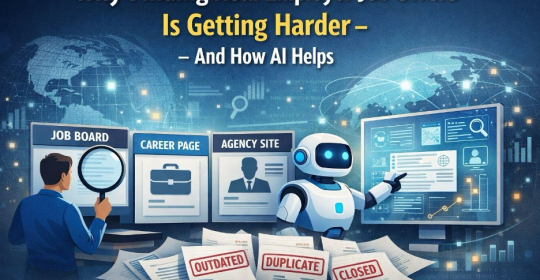But with so many variables to consider, and so many potential trap falls standing between you and your dream job, how are you going to make sure you’re making the most of your opportunities and getting in the mix when it comes to interviews, hirings, and understanding what a medium-sized company needs from you?
The future of accounting is there for you to grasp. But in order to do so, you’ll need to know how to land that perfect accounting job at a midsize company that offers big-time career prospects.
Why are accounting jobs at midsized companies so in-demand?
The last few years have seen some unexpected paradigm shifts in business and commerce. And these shifts have highlighted some unforeseen gaps and opportunities for ambitious accountants to step up and make themselves invaluable to the right company.
But how have midsized businesses become that “right company” for so many people as of late?
A clear and unified front
Larger companies tend to keep an accounting department separate from other departments, which is why so many larger businesses experience confusion and poor communication with their payroll and accounting teams.
But smaller to midsized companies are more focused on integrating all areas and levels of a workforce to function better in unison. Why? Well, because, quite frankly, they cannot afford to create any potential confusion between departments.
Moving with the times, not against them
Continued advancements in the industry such as accounts payable software have created a clear divide between forward-thinking businesses and companies that lack the vision to move with the times. A medium enterprise encourages departments to work efficiently alongside these technological advancements, instead of opposing them.
Let’s face it - the innovative model of a faster, more accurate accounting system was never going to work best in the sea of confusion that so many big companies now find themselves in.
Career growth and freedom
In addition to this, accounting jobs at these firms come with more freedom, less internal office politics, and a trimmed-down accounting team that encourages growth and progress up the career ladder, instead of suppressing it.
In an age where big business struggles to keep up with their faster, smaller competitors, aspiring accountants are setting their sights on these new and exciting horizons, while experienced accountants are discovering the benefits of a more simplified process, and looking to make moves of their own.
Understanding what a midsize company needs in an accounting team
Day-to-day work
Various businesses are going to have different requirements and needs, but in general, a midsize company’s financial matters might not be as intricate and complex as that of a big business, but they’ll certainly be a scale-up from a small business.
Regardless of size, there are still complexities and pressures to be precise and accurate. Day-to-day operations may include strategic control of company cash flow, dealing with bank loans, company equipment financing, and more.
Accounting team structures
Before looking at how a midsized business is structured, it’s important to take a broad look at the general roles within a standard larger-scale company’s accounting department. As a general rule, you’ll see the following roles in the majority of offices.
- CFO (Chief Financial Officer)
- Controller
- Accounting Manager
- Accountants (General)
- Accounts Payable Staff
- Accounts Receivable Staff
- Payroll Staff
Now, for small businesses, you can expect to shrink that accounting team down to as little as 4 people. That team would usually consist of a few full-time staff to deal with daily AR and AP tasks, a full-time Controller, and possibly a CFO on reduced hours who oversees and plans out the bigger picture.
But, and here’s where you’re able to begin putting a strong candidate plan together, midsized companies tend to have a team of 10-12 individuals in their accounting teams. In those teams, they’ll have some key skilled and experienced staff and a smaller pool of accountants with varying degrees of experience and skills.
And it’s within that gap where you can aim to establish yourself as the perfect candidate for the role in question.
Getting noticed the right way
So, you’re now fully aware of the benefits a medium-scale business can offer and the general structures of different-sized accounting departments. You’re even fully aware of what a company of this size is in dire need of when hiring new staff.
We’ve done the heavy lifting for you here, so all that’s left for you to do is add make the next 3 simple but effective steps to get noticed and make yourself the perfect potential candidate.
Step 1: Do your research
A midsize accounting role needs someone with the ability to manually handle tasks and the knowledge of how accounts software works too. Take some time to research the history of the company in question.
Scour their content and social media posts for clues about the software they use. Make sure you’re well-versed in that system before going further.
Step 2: Look for a need you can fill
The next step is to visit the team sections on their website and LinkedIn pages. From there, you’ll be able to get a better idea of how their accounting structure works, how many team members they have, and where your skills would be of use within those gaps.
Step 3: Get on their radars
Now that you’ve ensured you know the software they use, and you understand the needs of a medium-sized company, you can highlight those selling points on your application and stand out from the rest of the applicants.
Mastering the art of the interview
If you reach the interview stage for an accounting position, you can expect some in-depth questioning, a lot of deliberation, and several stages you’ll need to get through.
Why? Because these are the kind of companies that need to be certain they’re choosing the perfect candidate. Just as you’re trying to discover that dream role, they’re gauging how you’d fit into their close-knit accounting team.
Tips on how to dress and act during a job interview are a dime a dozen, and you know them all already. So instead, here are some questions you could ask during the interview to show that you care about the role and want to become an integral part of the company.
- Do you contract out your tax filing? Is there any prep work your staff complete for it if so?
- How often do you conduct or receive internal and external audits?
- Are you currently issuing reports weekly, monthly, quarterly, or annually?
- What’s the biggest issue in the department? What could I do to help?
- Is there anything that makes you feel like I wouldn’t be a good fit for this position?
Be sure to leave the bottom question until last, and use it as an opportunity to elaborate on your knowledge of their systems and processes, as well as your desire for responsibility and the chance to grow and progress in a midsize company.
Following up
Within 24 hours of your interview, be sure to send a brief but polite follow-up message. In that message be sure to cover the following 3 things:
- Politely ask for constructive feedback
- Reiterate how much the role means to you
- Thank them for their time
After that, avoid being too pushy, and leave things there until you hear from them again with an update on your application.
Keeping a line of communication open
Whether you’re successful in those final stages or not, it’s always a good idea to keep in communication with the people you engaged with. There are a lot of tips and guides out there about nailing your dream role the first time, and while there’s nothing wrong with that, the majority of us are going to have to bide our time until that perfect role pops us again.
That’s why all of your preparation and planning shouldn’t be thrown away and deemed a failure if you don’t land your accounting job immediately. These things, like anything worth having in life, inevitably take time. But if you can stay positive and follow these steps listed above, you’ll be setting yourself up for a future that’s right for you, and in the right midsized company for your specific goals.






